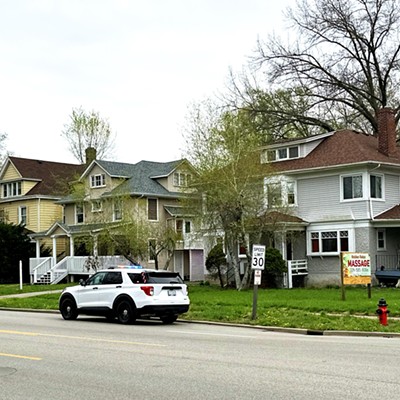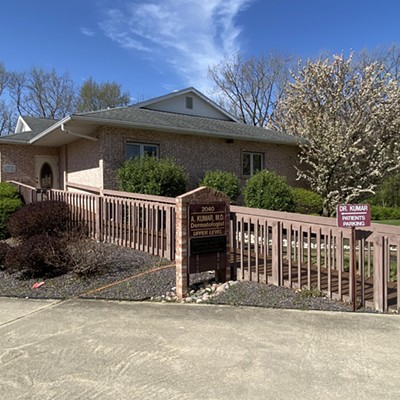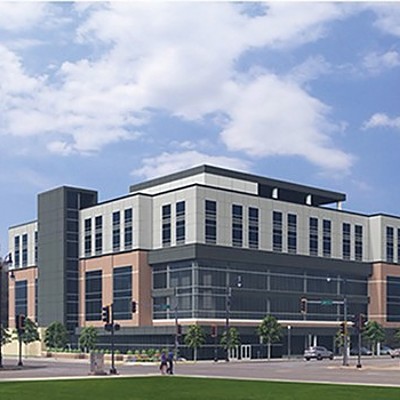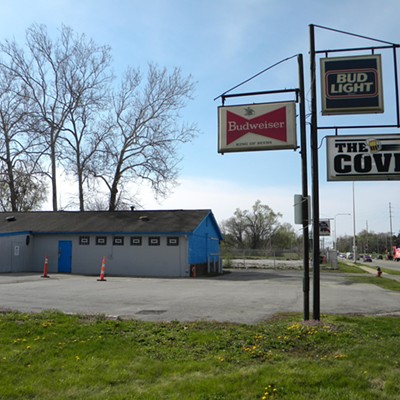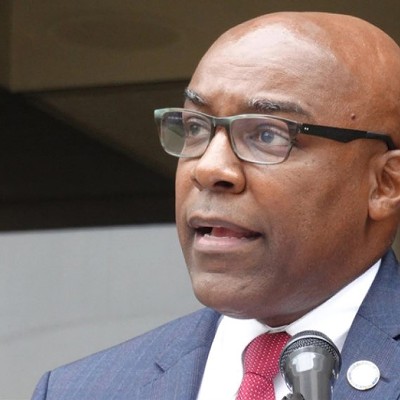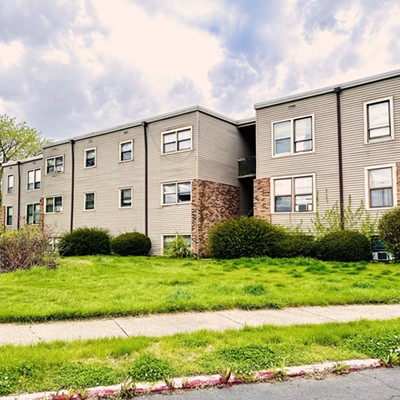Dave Allen encounters familiar sights as he drives down alleys in Springfield's Harvard Park neighborhood.
Some alleys are relatively clean while others are filled with overflowing bins of garbage that haven't been emptied for weeks, half-open bags of trash on the ground, trails of garbage blowing into yards and streets, discarded furniture and old mattresses.
The smell of dirty diapers and decaying food is unmistakable, and it's not even summer yet as Allen shows an Illinois Times reporter around the working-class neighborhood, which extends from Sixth to 11th streets and from Ash Street to Stanford Avenue.
"This is what we deal with on a day-to-day basis," said Allen, who works for an underground public utility locating service and is active in the Harvard Park Neighborhood Association. "I'm not trying to pick on neighbors. I know times are rough, but have some common courtesy."
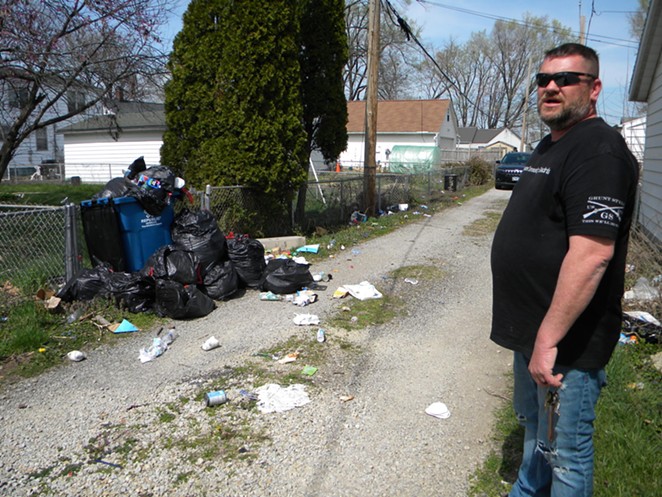
With Springfield down to two residential waste haulers and Mayor Misty Buscher closing in on one year of her first term as mayor, activists from Harvard Park, Enos Park, Lincoln Park and other older neighborhoods are hoping for comprehensive change in the way Springfield regulates garbage collection. They have proposed solutions for years without success.
Buscher said solving the issue of "fly dumping," or illegal dumping, and residents and landlords allowing individual garbage collection agreements with haulers to lapse and garbage pile up, is one of her top priorities.
The problem is more acute in older neighborhoods with large numbers of renters and residents who are struggling financially, activists said.
Neighborhood alleys, which aren't as prevalent on the city's more affluent west side, allow for dumping and pileups of garbage largely out of public view. And Allen said it can take weeks for the complaint-driven system to result in fines and other enforcement measures.
"Now is the time to adjust how we approach garbage."
Big changes don't appear to be coming soon. Buscher told Illinois Times that she and members of the City Council first want to work on addressing specific problem-ridden properties and making sure haulers are fulfilling contractual obligations to their customers.
That should come before the city considers systemic changes such as requiring all private garbage haulers to bill customers through City Water, Light & Power bills rather than individually, she said.
"We're just working really hard to try to solve some of these problems first before we shoot from the hip," Buscher said. "We want to fix the internal problems first. Just give us an opportunity to get some things done before we are asked to make major changes."
But neighborhood activist Mark Mahoney said comprehensive reforms are needed, such as centralized billing and requiring collection of large items such as old couches and mattresses as part of regular waste-hauling contracts rather than the city contracting with a separate organization that residents must contact.
These moves would make it easier for the city to identify and focus enforcement efforts on properties where garbage piles up and where renters, landlords or homeowners allow garbage service to lapse, he said.
Many residents aren't even aware of the current large-item pickup system, which is handled through a city contract with nonprofit Habitat for Humanity and paid for with a $4.50-per-month recycling fee tacked onto CWLP bills that also funds yard-waste pickup, Mahoney said.
The lack of awareness and the time it takes to schedule and wait for large-item pickups – potentially several weeks – results in some residents leaving old furniture and mattresses in their alleys or illegally dumping them elsewhere, Mahoney said.
"We need to contract where garbage haulers pick up everything," he said.
Mahoney, a Hawthorne Place neighborhood resident, is a former Springfield Ward 6 alderperson and was public works director under former mayors J. Michael Houston and Jim Langfelder. He currently is president of the Springfield Independent Coalition for Our Neighborhoods (ICON), and his full-time job is chief of staff at the Abraham Lincoln Presidential Library and Museum.
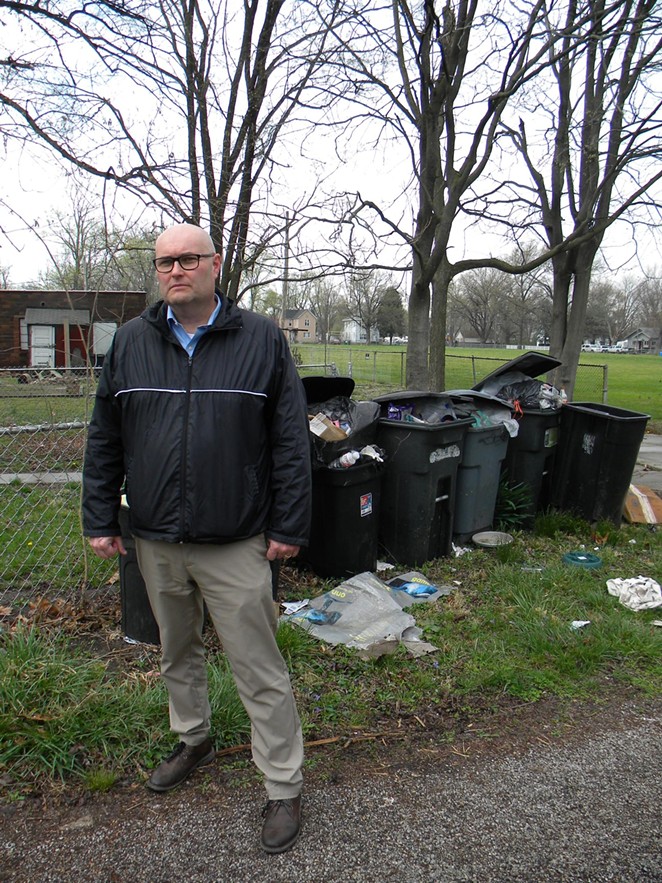
In addition to centralized billing, the city should consider establishing zones for garbage pickup by specific haulers, or one hauler for the entire city, to improve service and reduce deterioration of city streets caused by trucks from multiple haulers crisscrossing neighborhoods, Mahoney said.
Springfield's disjointed system stands out among more rational systems in comparable downstate communities such as Rockford, Peoria and Bloomington, Mahoney said. Those communities still have garbage problems but not of the magnitude seen in Springfield, he said.
"The overwhelming majority of people in Springfield get garbage service and it's not a problem," he said. "But it's hard to determine who doesn't have service and then do something about that.
"Now we're down to two waste haulers," he said, "so it seems like now is the time to adjust how we approach garbage."
Waste haulers want a rate increase
Springfield caps the maximum rate that garbage haulers can charge residential customers, or those in single-family homes and multifamily homes with three or fewer units.
The city requires all residential and commercial properties to have garbage pickup. For rental properties, the landlord is ultimately responsible and can be fined for violations, but landlords can allow their tenants to set up service with a hauler on their own, and the majority do.
In recent decades, Springfield has had as many as four private waste haulers serving residents and businesses. Publicly traded Waste Management earlier this year decided to transfer most of its residential business in Springfield to Republic Services, another publicly traded company, though Waste Management continues to serve commercial customers.
A Waste Management spokesperson said the company's move toward more automation – the increasing use of one-person garbage trucks operated with mechanical arms to pick up garbage containers – has made it hard to use the city's alleys to pick up trash in certain neighborhoods.
That decision meant Republic and Lake Area Disposal Service Inc., locally owned and established 92 years ago by the Crenshaw family, as the remaining haulers serving Springfield residents.
Both companies have been asking Springfield officials to authorize a rate increase, Buscher said. The last increase, granted by the City Council in 2016, allows for a monthly charge of $15 for one container of between 32 and 64 gallons and $18 for two containers of between 65 and 94 gallons. The rates generally are billed quarterly.
There has been an uptick in pickup delays, mostly by Republic, since Waste Management left the residential market, Buscher said. She said she has delayed proposing any increase to the City Council as leverage for improvements.
"I'm holding the rate increase they would like hostage to get the garbage picked up when it's supposed to be picked up – what they're paid to do," Buscher said.
Ward 2 Ald. Shawn Gregory, whose constituents live in some of the neighborhoods most plagued by garbage issues, said he, Ward 5 Ald. Lakeisha Purchase and Ward 8 Ald. Erin Conley recently formed their own working group to look at better ways the city can enforce existing ordinances dealing with illegal dumping on vacant properties and other code-enforcement issues.
Gregory said he is open to the city expanding its role to act as a billing vehicle for private garbage haulers. But he acknowledged that assisting struggling neighborhoods is multifaceted.
"It's a beast," he said. "We are working hard on it."
Republic declined comment for this story, but Lake Area officials said they are concerned that some of the reform proposals would either cut into their revenues or put them out of business entirely, providing less choice for customers and ultimately lower levels of service.
The company, which has been successful in the past in opposing major changes to the system, serves about half of the city's residential customers. Lake Area employs almost 90 people, about 30 of whom are related to the company's founders.
"The big companies – they want us out of here bad," said Eddie Cook, sales manager for Lake Area.
Allowing the city to collect garbage hauling fees on behalf of Republic and Lake Area would open a "Pandora's box" by making it easier for the city to contract with one waste hauler, Cook said.
"We believe in a free market," he said. "We would rather it be an open market, where you have to earn it. We have customers who love us."
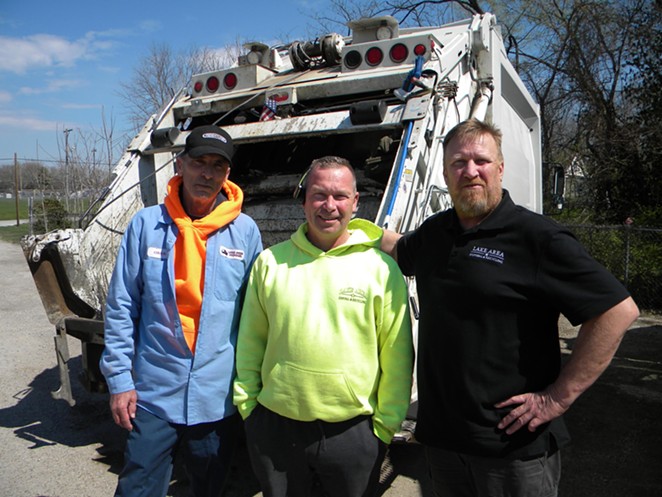
City officials could reduce fly dumping and ensure that more residents are getting their garbage collected by enforcing existing city ordinances, he said.
Having one waste hauler for the entire city would put Lake Area at a competitive disadvantage, Cook added.
Because Republic owns a landfill in Sangamon County and is a nationwide company, it could use its stronger cash flow to underbid Lake Area, he said.
"Eventually, the small guy is going to go out of business," he said.
"There's always fear of change"
Elsewhere downstate, other midsize communities have used a variety of options for garbage disposal.
Rockford contracts with a single hauling company, Rock River Disposal Service Inc., to serve all residential customers in single through four-family residential dwelling units. With the contractor fee and related fees included, the charge per dwelling unit, which includes recycling and yard waste pickup and the equivalent of several 95-gallon garbage bins, is $25.71 per month for 2024.
Customers pay through the city water bills. Only landlords and homeowners are charged; renters aren't billed. The contract also includes unlimited recycling and pickup of large items that residents put at the curb.
Fly dumping of residential garbage is "not much of a problem" in Rockford, said Rob Wilhelmi, a city staffer who oversees the waste disposal system. A more common problem is contractors who illegally dump construction waste, he said.
Peoria contracts with residential waste and recycling hauler GFL Environmental, a publicly traded company, for unlimited garbage pickup for residential customers. Large items can be placed at the curb for pickup, and recycling is included.
The fees to support the services, which amount to $300 per year for each single-family unit, are collected through property tax bills.
Fly dumping "remains a big issue" in Peoria, according to City Engineer Andrea Klopfenstein. But city leaders believe the problem would be worse without the comprehensive system, which has existed for at least 10 years, she said.
Bloomington and Normal both operate their own garbage collection services with city employees and city-owned equipment. The systems are funded through the municipalities' general revenues and fees.
Fees range from $19 to $35 per month in Bloomington, depending on the size of the garbage cart, and about $30 per month in Normal. Bloomington charges separate fees for bulk-item pickup, but drop offs at a bulk-item disposal site are free. Bulk item pickups are included in Normal's regular monthly fee.
Normal Waste Removal Supervisor Danny Edwards said fly dumping is rare in Normal. Bloomington still deals with fly dumping, said Shannon Prewitt, Bloomington superintendent of solid waste.
Champaign and Urbana have residential systems similar to Springfield's, but Champaign and Urbana don't regulate the cost that private waste haulers charge.
The reforms that ICON has proposed wouldn't eliminate illegal dumping and garbage pile-ups outside the homes of homeowners and renters, Mahoney said. But something big needs to be done after so many years, he said.
"We've been in this pattern for some time, and there's always fear of change," he said. He noted that Springfield already veers from a free-market approach by regulating the price that can be charged for residential service.
"There are a lot of ways to be creative and efficient," he said.
"Why can't we have a clean city?"
Polly Poskin, president of the Harvard Park Neighborhood Association, said the health of residents should be paramount to city officials when it comes to an efficient and effective garbage collection system.
"We're accommodating haulers," she said. "Why isn't the city accommodating the residents?"
Linda Maier, a real-estate broker and longtime member of the Enos Park Neighborhood Improvement Association, said getting rid of garbage, and especially large items, needs to be made simpler in Springfield.
"It has to be a no-brainer," she said. "People don't know about bulk-item pickup."
It makes sense to bill for garbage on CWLP bills, she said, because trash pickup "is more along the lines of a utility. It's part of a civilized society.
"What is it about the Springfield mindset that they can't pull the trigger?" she asked.
Bill Baskett, president of the Lincoln Park Neighborhood Association, was even more blunt when it comes to inaction by the city's current and previous mayors and city council members.
"It's laziness," he said. "Why can't we have a clean city? ... It can be better if people have the political will power and energy.
"If Mayor Buscher wanted to make a legacy in Springfield, she would have a contract with one waste hauler to do everything. Everybody should pay through the CWLP bill."
Not everyone agrees, though.
Longtime Harvard Park resident Robert Hamilton, a retired union cement finisher, said some people opt not to pay their CWLP bills, so that's not a long-term solution.
He said he would favor requiring landlords to pay for garbage service on behalf of their tenants.
Something has to be done soon about garbage, Hamilton said. "I've lived in this neighborhood all my life, and I've watched it decline," he said.
Chris Richmond, president of Moving Pillsbury Forward – the group guiding demolition and redevelopment plans for the former Pillsbury Mills factory site – said he has noticed that illegal dumping in the Pillsbury neighborhood breeds even more dumping.
"People just feel like it's free license to pile on," he said.
The problem is exacerbated by homeless people rummaging through garbage containers in alleys, according to former city resident and Springfield landlord Bill Barton.
"I do not have a magic wand"
After Waste Management completes a recently awarded five-month contract for pickup of yard waste in Springfield, Buscher said she plans to ask for longer-term bids for yard waste pickups for sections of Springfield.
The city's experience with a new yard-waste system – especially if multiple trash haulers take part – will help inform city leaders on how garbage service might be improved, Buscher said.
She asked that residents be patient on potential solutions to garbage problems as her administration deals with multiple legal issues left over from the previous administration, labor contracts and the lingering impact of the June 2023 derecho.
"I do not have a magic wand, and it doesn't get to come out and I can just fix things overnight," she said.
Allen, the Harvard Park resident, said his neighborhood, which covers part of Springfield south and east sides, can't wait forever.
"It's a good neighborhood," he said. "We just have a select few who don't take care of their property. Some people take care of their stuff, and some just don't care."
Dave Fuchs, the city's Public Works Department director, noted that Buscher's recent decision to reinstate "zone managers" assigned to various parts of the city – after the positions were eliminated more than 10 years ago – will help city officials resolve specific neighborhood issues involving things such as garbage, sidewalks, snow removal and sewer collapses "before they become major problems."
Five zone managers have been hired, and "they're being trained right now," Fuchs said.

